The mere mention of football is an emotional trigger for a surprising number of Tennessee fans. Some actually get excited and it isn’t even July.
A funny friend sent a screenshot of the infamous trash can, the turnover receptacle of the Butch Jones era, and asked that I forward it to Jeremy Pruitt as a gentle reminder of what matters.
I don’t think I’ll do that. I get in enough trouble without trying. Pruitt is well aware that turnovers win and lose games.
Early in his time with the Volunteers, Jeremy said you have to be able to run the ball and stop the run. Explosive plays are very important. It really helps to have some and prevent most. Good teams are good on third down. The red zone is critical.
After he warmed up, Pruitt said ball possession and security is what really matters. The whole deal is about the ball. That’s what the fight is all about.
It was refreshing to learn so soon that today’s coach believes in the long-ago Neyland maxim, the team that makes the fewest mistakes usually wins. How true, how true.
The most comprehensive study I’ve ever seen, based on hundreds of NFL games, found that the team that won the turnover battle won the game 78 percent of the time – with almost no variation from year to year.
Pruitt accepts that as near enough to the gospel.
“It’s pretty simple when you look at our record. Turning the football over and not getting enough turnovers is usually the difference in winning and losing.”
Sound fundamentals and attention to details by those with the ball are genuine fumble prevention. Hard hits and stripping techniques by aggressive defenders cause fumbles.
Bobbled handoffs are the standard price for a lack of concentration. Lax ball security, most often improper grip, invites fumbles.
Miscommunication between quarterbacks and receivers lead to a high percentage of interceptions. Poor routes and late throws are key factors. Most underthrows become incompletions. Overthrows down the middle are very dangerous. Bad things happen to passes tipped at the line of scrimmage.
Blocked kicks are usually linked to missed blocks or relaxed lane control – or extra effort from truly remarkable athletes.
An occasional turnover might be attributed to bad weather – ice-cold hands, sunspots, stiff wind or dreaded downpours. It’s OK to blame a very few on bad luck.
Loose-ball drills are part of Tennessee practice. Research says results are worth the effort. On average, defenses recover 49 percent of fumbles. On average, defenders intercept between 20 and 22 percent of the passes they get their hands on.
When a team captures several more turnovers than it loses, it has a chance to be very good – as measured by the polls and big bowl trips and nice rings and watches that work. When it gives up far more than it gets, anticipate coaching changes.
All turnovers are not of equal value. Where and when they happen is relevant. A fourth-down interception 40 yards downfield, just before halftime, is about like a punt.
Most fumbles cost the value of possession and only a yard or three in field position. Those near the goal that cost or turn into game-winning touchdowns matter a bit more.
Some turnovers cause giant swings in momentum. Pruitt would never admit that turnovers during garbage time become almost incidental if nothing else happens. Coaches fuss about them because they can lead to bad habits.
My funny friend observed that Tennessee was minus-one last season in turnovers. The Vols intercepted 15 passes and lost 13. The Vols lost seven of 16 fumbles and recovered four of 10 from opponents.
There have been better days. The 1970 Volunteers set the record for most takeaways, 57. In that era, the NCAA did not count bowl results in team statistics. Tennessee got eight more turnovers in the Sugar Bowl against Air Force, four interceptions and four fumbles.
“They were the best pass defenders we ever played against,” was the eventual conclusion of Air Force coach Ben Martin.
Think about that season: 40 picks, 25 fumble recoveries, 65 turnovers in 12 games, net of plus 25.
Larry Jones was defensive coordinator. Buddy Bennett was coach of the secondary. He had captain and senior Tim Priest and junior Bobby Majors as safeties. Sophomores Conrad Graham and David Allen were corners. Jackie Walker was a very supportive linebacker.
Majors had 10 of the official 36 interceptions. Priest had nine. Send me an e-mail if anything like that ever happens again.
Marvin West welcomes comments and questions from readers. His address is marvinwest75@gmail.com

